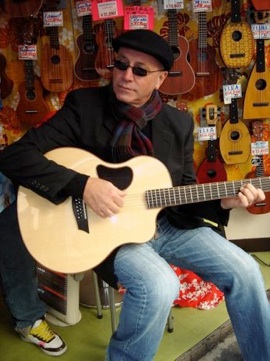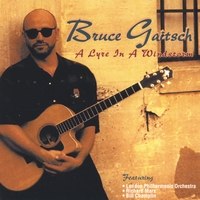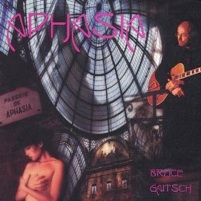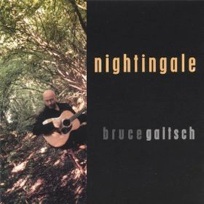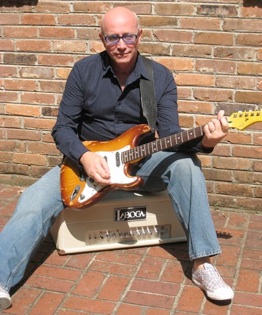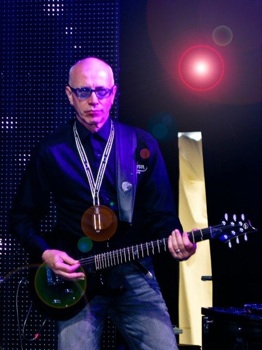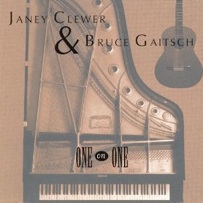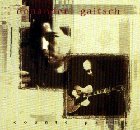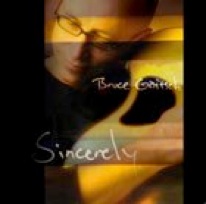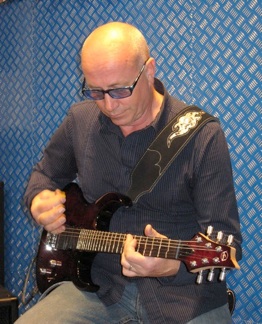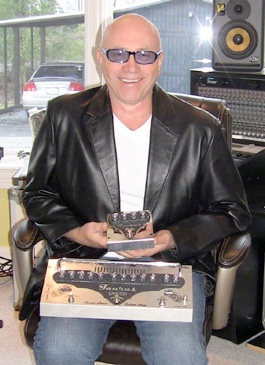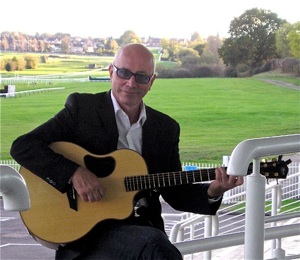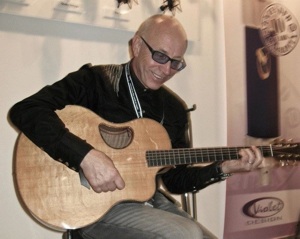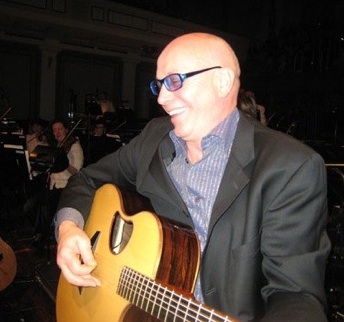The Man Behind the Music
For those of you who are not familiar with the name Bruce Gaitsch, why not sing that huge Richard Marx song “Don’t Mean Nothing” and consider yourself formally introduced. Co author of the 1987 megahit and somewhat featured on Marx’s huge debut album, it appeared the floodgates of success had opened though not one that came overnight. Over the years he has worked with other artists such as Jim Peterick, Evelyn Champagne King, Madonna, Chicago, Kansas, Marc Jordan and Earth Wind & Fire’s Philip Bailey just to name a few. This has not prevented him from finding the time to release six solo efforts that define the word smooth. Mainly Piano recently had the privilege to catch up with the guitarist and composer.
MP: Born and raised in the unique personality of the Windy City and the son of a father who owned a music store, what effect did this vibrant city have on you both as a person and a musician?
Bruce: Chicago made me a strong person…you have to be to survive there. To actually thrive there is rare. My parents both taught me how to make the most of your opportunities, and I did.
MP: Your first big musical break came by joining the band Ides Of March in the mid seventies headed up by Survivor’s Jim Peterik. What was the extent of your involvement in the band?
Bruce: I was never in the Ides but in Peterik's first solo career band. I was the guitarist and road manager…which meant I did all the work for no extra pay…I sure learned a lot.
MP: As a composer you managed to link up with R&B Queen Evelyn Champagne King courtesy of the hit “Just For The Night”. How did that come about?
Bruce: Hawk Wolinski (Rufus) was producing her and heard our song and wanted it. It was that simple.
MP: Even bigger were your collaborations with the brilliant Richard Marx that has flowered into an endearing friendship. Give us some insight with the early beginnings and how this musical partnership continues to flourish?
Bruce: Richard and I go way back. We did jingles for his father together starting in 1975. Lucky for me when he moved to LA (when he was 18) he wanted me to play with him still. So I was going back and forth until the move in 1984. He and I still talk on the phone and play together up at his studio in Chicago. He is a dear friend and a great talent.
MP: You have also collaborated several times with Patrick Leonard and saw huge success with Madonna’s #1 hit “La Isla Bonita” back in 1987. Two years late you formed the group King Of Hearts that would end up being a partnership with Tommy Funderburk, though no offense to Tommy but it does not appear you initially planned for Tommy to be your main vocalist. What was the good, bad and maybe the ugly about King Of Hearts and just exactly how many albums were released?
Bruce: Pat Leonard and I were also pals in Chicago and he actually introduced me to Hawk. He is a dear friend as well and thanks to him I have been on many big, big records.
King of Hearts was always starring Funderburk, but in the beginning Timothy Schmit was also in the band. The Eagles reformed right after we started so he had to bow out and we got George Hawkins JR, another huge talent. The great things about King of Hearts were the songs and friendships that started in that band. The bad things were the egos and bad business dealings that led us nowhere. The ugly things were too many to mention. We released 4 CD's worldwide with the latest being 1989 in Europe on the Avenue of Allies Label.
MP: Despite King Of Hearts not evolving the way you expected, six years later you finally released your first solo album in 1995 though the first country it was released in was Japan. It flirted with the Smooth Jazz and AOR genres and at certain times the commercial nuances of the New Age/Contemporary Instrumental genre. A Lyre In A Windstorm is a very curious title. Would you care to elaborate on its title, creative process and why Japan to release your first solo album?
Bruce: “A Lyre in a Windstorm” is a phrase I heard in my college Humanities class. It is in regards to how an artist should reflect the times and feelings of the age they are living in. We should be as "A Lyre in a Windstorm" making music/art that reflects our surroundings and inspirations. Japan gets me…I love Japan. They are true music nuts over there. They were the first to offer that's how it happened.
MP: The album features several names including Richard Marx, Marc Jordan, Chicago’s Bill Champlin, the Eagles Timothy Schmit and producer Jeremy Lubbock just to name a few. Perhaps a lesser name to others, the one that really popped out for me was hearing David Boruff, famous for his saxophone work with David Foster. Why the decision to showcase him on the flute on “Colorado”? Are there any thoughts on any future collaboration with Boruff?
Bruce: Dave and I have been friends for a long long time. Whenever I need a sax or flute I send him the track and he plays something way better than I could ever think of. Dave and I will always work together. By the way I produced the cd. Lubbock only produced his tune which was an incredible thing for me.
MP: While your debut album was smothered in the smooth, your second effort Aphasia (another interesting title) in 1997 was a little more eclectic. This time around you took on the production duty and it appears the arrangements are impeccable but the lower registers are not quite as deep as the previous album. Was this intentional?
Bruce: I am not quite sure what you mean but this cd does reflect exactly where I was at this time, flirting with NYC musicians and blending my influences. Aphasia was the title of the Champlin tune and I thought it was so cool that it had to be the title. Look it up...it is an affliction that renders you incapable of speech.
MP: The album features your collaboration “Crucifix In Dreamland” with Marc Jordan who fifteen years later not only features it on his latest solo album but it is the namesake of his latest album. So is the intent of your solo efforts more to showcase your songs or purely a process for you to be creative in writing your own music?
Bruce: If you listen to Marc's new cd you will see it is the same title but a different song. Marc is a great friend and a total genius. My solo projects are the result of me gathering my recordings from a certain period of time and slamming them together into a cd. Sometimes they work smoothly together sometimes they don't. I am just doing what I do.
MP: As songwriter, there must be times when your place your “musical child” into the hands of a performer and just pray that it is interpreted the way you hope it would be. As a songwriter how much of voice do you have in the final interpretation?
Bruce: None.
MP: The following year you released two recordings one of them being Counterparts which continued the eclectic efforts of Aphasia. Nevertheless, Counterparts is still a very different cup of tea which features you with electric guitarist Tommy Denander, well known for both his playing and prolific production efforts. As your websites states it was “A duo record made 5000 miles apart” which also speaks volumes to your very different styles. How did you coordinate your efforts and decide who would do what?
Bruce: It was easy. Tommy sent me tracks to play on and I sent him tracks to play on. Then he mixed it in Stockholm and I listened and said hell yes!!!
MP: Your other recording in 1998 was Nightingale that you refer to as your most cohesive recording to date. Of what I have heard it appears to be an amalgamation of your debut album and your last recording Sincerely. With the exception of “Villa Lobotomies” there was certainly a more mellow approach when relating to your two prior recordings. Was there a personal influence that reflected the mood change in your music or was it just about where you were at the time creatively?
Bruce: Richard Marx commented that he thought I should include more of my acoustic guitar ditties. I never think about styles or influences. I just do what I am feeling and then give to the public.
MP: After many years of marriage and some past occasional musical collaboration, in 2001 you and your wife Janey Clewer finally decided to complete a full project together entitled One On One. The music is sublime, soft and luxuriate, full of piano, guitar and strings. What compelled the decision to finally work in complete tandem this time around?
Bruce: When Janey and I met and fell in love back in 1989, she would sit at the piano and play the most beautiful music. I asked her to record the music from her piano bench where she stores it and this cd is the result of that. She made me play on it. I am definitely the weak link in the family talent pool.
MP: Your most recent solo effort entitled Sincerely released in 2006 is stripped down with essentially you on a beautiful McPherson guitar. There are occasional musical visits from Janey Clewer on the vocal enhancement, Howard Levy on the harmonica and Samantha Gaitsch on flute. Otherwise it is just you playing on a beautiful recording. This must have been a very vulnerable yet freeing recording. What prompted this much unplugged approach?
Bruce: Matt McPherson had a record company at the time putting out records of his favorite guitarists that played his incredible guitars. He called me and asked me to do a record for him. I said yes of course but can I do it my way, he said "Anyway you want.” So my idea was to really feature these incredible instruments and nothing bigger than the guitar would be recorded. I think it is my best record and I wrote all the songs and recorded it in a month. It took longer to decide on which reverb to use than to make the record. Howard Levy is the finest harmonica player in the world. He and I have been friends since the 70's from sessions in Chicago.
MP: While it has been 6 years since your last recording you have kept yourself very busy with various collaborations, one of them profiling on Chicago’s 2008 album Stone Of Sisyphus. Tell us a little about that opportunity?
Bruce: Back in 1993 Bill Champlin, Robert Lamm and producer Peter Wolf invited me to be a part of the new Chicago Record. I rehearsed with them a few times and we all got along great. So when we camped out at Peter's studio in the Simi Valley I was there for the entire project. It was a total blast. Their touring guitarist Dwayne Bailey, who is a monster player and singer, wasn't stepping up to the plate in the studio creatively and lucky for me because he is incredible. I found out later there was tension between him and Walt due to a dating of the daughter type thing.
We spent a long time getting that record made and then Warner Bros didn't understand it and it was shelved until 2008. It still sounds great and current after all the years in the vault and it includes some of my best electric guitar playing ever. Just listen to "The Pull".
MP: Even more recently, you have been performing with former Chicago vocalist and bass player Peter Cetera who has not recorded in recent years. Any future collaborations there or is that more a band gig?
Bruce: Peter and I have been pals since 1987. I have played on every record of his since then and in 2003 he started a live gig situation where we would play his hits with an orchestra. We have since added a rock band to the concerts too. It is a total blast playing these timeless classics with the real singer.
MP: Your website also makes mention of a group effort that also features your wife Janey Clewer in a band called Bossa Nova Hotel but there is not a lot about the group online. Please enlighten me on that project and who it involves?
Bruce: The Bossa Nova Hotel was a band we put together for our friend Richard Rudolph. We decided to do new versions of classic songs in a Brazilian style, a huge challenge for me as a guitarist. Go get the record from CD Baby or iTunes. You won't believe how great Janey sings and of course our leader member was Mike Sembello (Maniac) who is a total wacked out genius. We even did a series of concerts at The Cotton Club in Tokyo.
MP: While you are certainly keeping busy, any plans of future recordings from you as a solo artist? If so any idea what musical road your listeners might expect to see?
Bruce: I have many songs already recorded and I am waiting for there to be enough that mesh for a new cd. I can only say the musical road they can expect will have many twists and turns but it will always be scenic.
MP: In the past, several of your recording labels have gone under most specifically the West Coast specialty label Thoughtscape Sounds. While this somewhat reflects our current economic climate, the music industry even more so is at a crossroad. How did the industry get here and how does musician survive financially, yet keep his creative integrity?
Bruce: The industry got here from greed and stupidity. When the labels started to fail most of us thought, "well it couldn't happen to nicer guys". To survive you need to try new things, extend yourself and say yes as much as possible.
MP: If no current plans to record what else can we see from Bruce Gaitsch in the New Year?
Bruce: I am always recording. More shows with Peter, more trips to Europe, concerts in Japan and a new cd sometime soon.
MP: Finally, thank you for taking the time to speak with Mainly Piano and wishing you and your wife a wonderful Holiday.
Bruce: Thank you very much for asking.
Discography available at CD Baby:
A Lyre In A Windstorm - EMI Japan 1995
Aphasia - Thoughtscape Sounds USA 1997
Nightingale- Angelynn USA 1998
Counterparts - Angelynn USA 1998 (with Tommy Denander)
One On One - Angelynn USA 2001(with Janey Clewer)
Sincerely – Autumn Records USA 2006
Michael Debbage
December 2012

